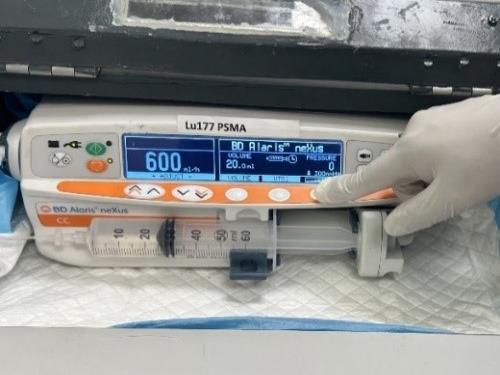
In A First, HMC Uses Nuclear Medicine To Treat Prostate Cancer
Doha, Qatar: Hamad Medical Corporation (HMC) has started using a nuclear medicine treatment technology, known as Lutetium-177 for prostate cancer patients for the first time in Qatar. The first patient successfully received treatment at HMC's National Center for Cancer Care and Research (NCCCR) Nuclear Medicine Department, offering many patients the convenience of receiving this treatment locally rather than traveling abroad.
Dr. Maryam Al Kuwari, Chief Radiologist for Nuclear Medicine at HMC, said: "Therapies utilizing Lutetium-177 technology offer hope for patients who have tried all conventional treatment options without any improvement in their condition. With this treatment, we can improve the quality of life for patients with neuroendocrine tumors and those battling prostate cancer."
Dr. Maryam Al Kuwari, Chief Radiologist for Nuclear Medicine at HMC
Dr. Al Kuwari added that the new technology also enables the diagnosis of breast cancer tumors by administering a radioactive substance (FES) to the patient, followed by an imaging procedure for precise tumor localization. She emphasized that HMC is continuously striving to introduce the latest diagnostic procedures, which will contribute to reducing the need for patients to seek medical care abroad. Dr. Al Kuwari described the introduction of this new technology as a significant medical milestone, reflecting the dedication and efforts of nuclear medicine physicians, oncologists, and radiology technicians at HMC to ensure the delivery of high-quality care to all cancer patients.
Dr. Ghulam Syed, Head of the Nuclear Medicine Department at HMC, said: "The Nuclear Medicine Department recently began offering a new treatment for cancer patients for the first time in Qatar, known as radiotracer therapy. In this treatment, patients are given an injection of a tracer carrying radionuclide to deliver radiation to the cancer cells."
Commenting on the use of nuclear medicine in cancer treatment, Dr. Syed explained that one type of this treatment is given to patients over the age of 18 who were diagnosed with neuroendocrine tumors that have spread in the body and have not responded to conventional therapies. Another type of this treatment is given to male patients with metastatic prostate cancer who have not responded to hormonal therapy.
Dr. Ghulam Syed, Head of the Nuclear Medicine Department at HMC
"These innovative treatment modalities have become the standard of care for cancer patients, with international organizations recommending their use in cases where traditional treatments have proven ineffective. By incorporating these advanced therapeutic approaches for our patients at HMC, the Nuclear Medicine Department has now become part of the global network committed to implementing established guidelines on clinical and technical practices, patient safety, and radiation protection," added Dr. Syed.
Dr. Syed explained that with the introduction of Lutetium-based treatments, patients can now continue their treatment journey to control cancer, particularly for those with neuroendocrine tumors and prostate cancer who have not responded to hormonal or chemotherapy. They now have a new treatment option comprising 4 to 6 doses administered at intervals of 6 to 8 weeks. The fight against the disease commences with the initial dose, and over time, doctors observe significant improvements in patients' conditions.
"Every year, there are approximately 8 to 10 patients with neuroendocrine tumors and about 16 patients with prostate cancer who don't respond to conventional treatment options. These patients can now receive treatment with the new modalities available at HMC and avoid the need to travel abroad," said Dr. Syed.
Healthcare professionals at Nuclear Medicine Department at HMC
Dr. Syed noted that four patients with neuroendocrine tumors have been registered since September 2023, one of whom received four treatment cycles, and the remaining three received three cycles each. Two patients with prostate cancer have been registered since February 2024, each receiving two cycles of the new treatment so far. He added:“All patients are doing well. Clinically and as per laboratory findings, they are improving, and they have not developed any significant side effects from the treatment. The initial results are encouraging. A detailed response analysis is planned for each patient after the completion of four cycles of the new treatment to ensure patient safety and the quality of medical care provided to them.”

Legal Disclaimer:
MENAFN provides the
information “as is” without warranty of any kind. We do not accept
any responsibility or liability for the accuracy, content, images,
videos, licenses, completeness, legality, or reliability of the information
contained in this article. If you have any complaints or copyright
issues related to this article, kindly contact the provider above.


















Comments
No comment